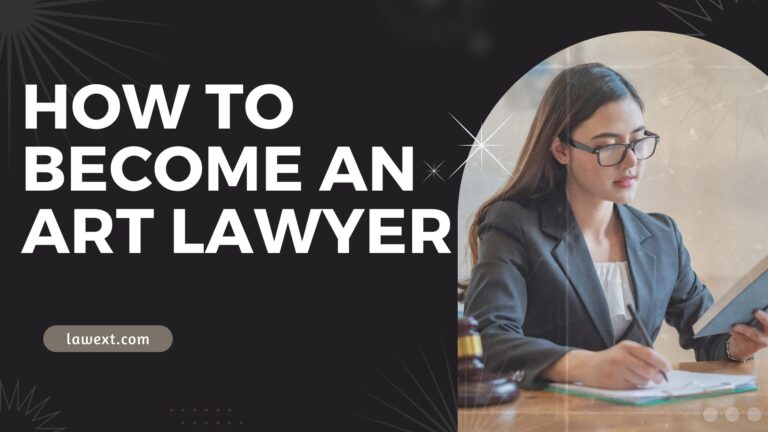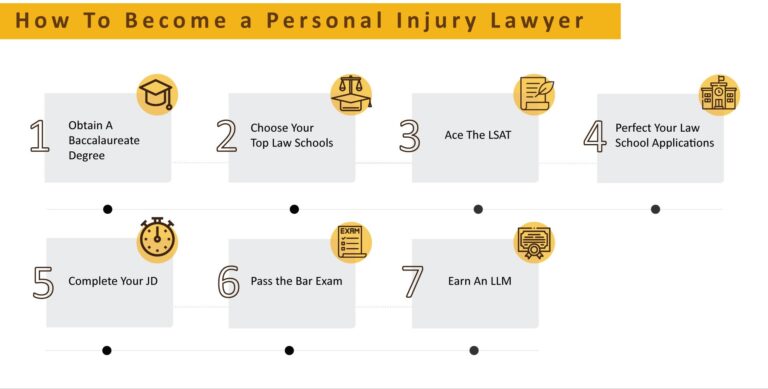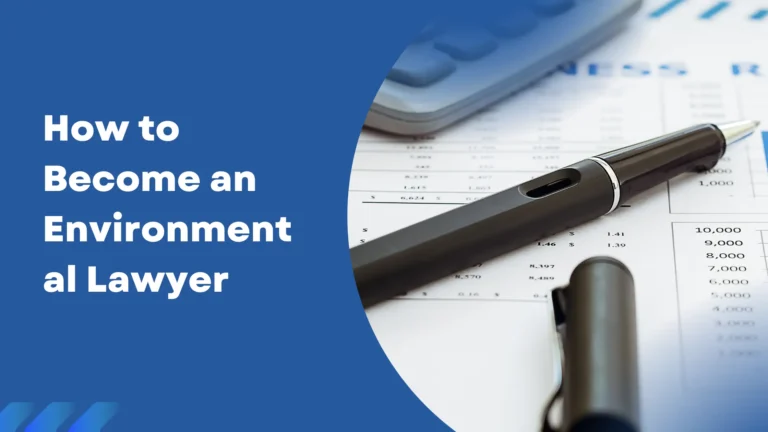How to Become an Intellectual Property Lawyer?

To become an intellectual property lawyer, you must complete a bachelor’s degree, attend law school, pass the bar exam, and gain experience in intellectual property law through internships, clerkships, or entry-level positions. Intellectual property law focuses on protecting and enforcing legal rights for creations such as inventions, designs, trademarks, and copyrights.
Table of Contents
This field requires attention to detail, strong analytical and communication skills, and a deep understanding of intellectual property laws. Intellectual property lawyers often work in law firms, corporations, or government agencies, helping clients navigate complex intellectual property regulations, negotiate agreements, and litigate disputes.
If you have a passion for creativity, technology, and the law, and want to know How to Become an Intellectual Property Lawyer may offer a rewarding career path.
Education And Qualifications
When it comes to becoming an intellectual property lawyer, education and qualifications play a crucial role. Obtaining the necessary knowledge and credentials is essential to this highly specialized field of law. In this section, we will delve into the various steps you need to take to embark on a career as an intellectual property lawyer.
Undergraduate Degree
Earning an undergraduate degree is the first step towards becoming an intellectual property lawyer. While there is no specific major required, it is advisable to pursue a degree in a related field such as law, engineering, or science. A strong foundation in these disciplines will provide you with the necessary knowledge of technical and scientific concepts that are often involved in intellectual property cases.
Law School
After completing your undergraduate degree, the next vital step is to attend law school. Law school typically lasts for three years and equips aspiring lawyers with the legal knowledge and skills necessary to practice law. During your time in law school, it is advisable to focus on coursework related to intellectual property law. This will help you gain a deeper understanding of the intricacies involved in protecting and managing intellectual property rights.
Licensing Or Certification
Upon graduating from law school, aspiring intellectual property lawyers need to pass the bar exam in the jurisdiction where they wish to practice. The bar exam assesses the individual’s knowledge of the law and their ability to apply it in practice. Additionally, some jurisdictions may require specific licensing or certification for intellectual property lawyers. These additional requirements may vary depending on the jurisdiction, so it is essential to research and comply with the specific regulations in your desired location of practice.

Developing Expertise In Intellectual Property Law
To become a successful intellectual property lawyer, it is essential to develop expertise in the field of intellectual property law. This requires a combination of specialized knowledge, practical experience, and continuous professional development. Here are some key steps you can take to develop expertise in this exciting legal area.
Specialization In Ip Law
Specializing in intellectual property law is crucial for aspiring intellectual property lawyers. By focusing on this specific area of law, you can develop a deep understanding of the laws and regulations that govern intellectual property rights. This specialization will enable you to provide more comprehensive and effective legal advice to your clients.
To specialize in IP law, consider:
- Pursuing advanced courses or a master’s degree in intellectual property law
- Joining professional organizations and attending seminars or conferences related to IP law
- Participating in moot court competitions or writing papers on IP law topics
Internships And Externships
Internships and externships are invaluable opportunities for gaining practical experience in the field of intellectual property law. These experiences will allow you to work alongside experienced IP lawyers, observe real-world cases, and apply the knowledge gained from your studies. Additionally, internships and externships can provide networking opportunities and help you build relationships with professionals in the field.
When searching for internships or externships:
- Contact law firms, corporations, or government agencies specializing in intellectual property law
- Apply for summer programs or clerkships at IP-focused organizations
- Research and reach out to IP law clinics associated with law schools
Continuing Education And Professional Development
Intellectual property law is constantly evolving with new legislation, court decisions, and technological advancements. Therefore, it is essential for intellectual property lawyers to engage in continuous education and professional development to stay updated and enhance their expertise.
Ways to continue your education and professional development:
- Attend conferences, seminars, and workshops specifically focused on intellectual property law
- Participate in webinars or online courses to expand your knowledge
- Subscribe to intellectual property law publications and newsletters
- Join intellectual property law associations to gain access to educational resources and networking opportunities
By specializing in IP law, gaining practical experience through internships and externships, and pursuing continuous education and professional development, you can build expertise in intellectual property law and establish a successful career as an intellectual property lawyer.
Building Knowledge In Ip Law
Building a strong foundation of knowledge in intellectual property (IP) law is crucial for anyone aspiring to become an intellectual property lawyer. This field requires a deep understanding of intricate legal concepts and regulations. To excel in this profession, you need to familiarize yourself with IP laws and regulations, stay updated on industry trends, and build a network with IP professionals.
Familiarize With Ip Laws And Regulations
To become a successful intellectual property lawyer, you need to be well-versed in IP laws and regulations. Start by studying the fundamental aspects of intellectual property, such as patents, copyrights, trademarks, and trade secrets. Understand the legal principles that govern these areas and the processes involved in obtaining and protecting intellectual property rights.
Below is a table summarizing the key areas of IP law:
| IP Law Areas | Description |
|---|---|
| Patents | Government-issued exclusive rights for new inventions |
| Copyrights | Legal protections for creative works, such as books, music, and artwork |
| Trademarks | Protecting brands and logos associated with products or services |
| Trade Secrets | Confidential business information that provides a competitive advantage |
Once you have a solid foundation, dive deeper into specific topics within IP law, such as international intellectual property treaties, enforcing IP rights, and handling IP disputes. Examine relevant case laws and real-world examples to grasp the application of these legal principles.
Stay Updated On Industry Trends
The field of intellectual property law is constantly evolving, driven by advancements in technology and changes in global markets. To stay competitive, it’s essential to stay updated on the latest industry trends and developments.
Here are some strategies to help you stay informed:
- Subscribe to reputable legal publications and online resources focused on intellectual property law.
- Attend seminars, conferences, and workshops that cover IP law topics.
- Join professional organizations and associations dedicated to intellectual property law. These organizations often provide valuable resources, training opportunities, and networking events.
- Engage with thought leaders and experts in the field through social media platforms, such as LinkedIn and Twitter.

Network With Ip Professionals
Building a network of connections with IP professionals is invaluable in the field of intellectual property law. Networking allows you to learn from experienced practitioners, gain insights into the industry, and potentially open doors to career opportunities. Here are some ways to expand your network:
- Join local and national intellectual property associations and attend their events.
- Participate in intellectual property law conferences and seminars.
- Volunteer for pro bono cases related to intellectual property law to connect with other professionals in the field.
- Utilize online platforms, such as LinkedIn, to connect with lawyers, patent agents, and other IP experts.
Gaining Practical Experience
After obtaining the necessary education and passing the bar exam, it’s time to gain practical experience in the field of intellectual property law. This experience is vital for honing your skills, building your network, and establishing yourself as a proficient intellectual property lawyer. Here are three avenues you can explore to gain practical experience in this field:
Working In Ip Law Firms
One of the most common paths to gaining practical experience in intellectual property law is by working in IP law firms. These firms specialize in intellectual property cases and provide a wealth of opportunities for aspiring lawyers. Working in an IP law firm allows you to get hands-on experience in conducting legal research, drafting and reviewing patent applications, handling trademark registrations, and assisting in litigation matters. This provides a dynamic learning environment where you can develop a deep understanding of intellectual property law and its application in real-life scenarios.
In-house Counsel Positions
An alternative pathway to gaining practical experience is by pursuing in-house counsel positions. Many companies, particularly those in industries that heavily rely on intellectual property, hire lawyers to work exclusively within their organization. As an in-house counsel, you will have the opportunity to handle a variety of intellectual property matters specific to that company.
This could involve negotiating and drafting licensing agreements, managing trademark portfolios, conducting IP due diligence for mergers and acquisitions, and providing legal advice to ensure intellectual property rights are protected. Working in an in-house counsel position allows you to develop a deep understanding of intellectual property law within a specific industry, and you will have the chance to work closely with the company’s business teams and stakeholders.
Government Or Non-profit Entities
Another avenue to gain practical experience in intellectual property law is to explore opportunities in government or non-profit entities. These organizations often deal with complex intellectual property issues and work on behalf of the public interest. In this role, you may work on cases involving patent disputes, trademark infringements, or copyright violations.
Government agencies such as the United States Patent and Trademark Office (USPTO) or non-profit organizations like the Electronic Frontier Foundation (EFF) provide invaluable exposure to a wide range of intellectual property matters and allow you to contribute to the development and enforcement of intellectual property laws.
By gaining practical experience through working in IP law firms, pursuing in-house counsel positions, or joining government/non-profit entities, you will gain invaluable exposure and learn how to navigate the complexities of intellectual property law. This hands-on experience will enhance your legal skills, expand your professional network, and position you as a competent intellectual property lawyer.

Developing Skills And Attributes For Success
Developing the right skills and attributes is crucial for success in the field of intellectual property law. As an intellectual property lawyer, you will need to possess a unique combination of qualities that will enable you to excel in this complex and competitive field. Here are three key skills and attributes to focus on:
Strong Analytical And Research Skills
Strong analytical and research skills are essential for any intellectual property lawyer. You will need to analyze complex legal issues and identify relevant statutes, regulations, and case law that apply to your clients’ unique situations. Researching and staying updated on current intellectual property laws and precedents is crucial for providing accurate and effective legal advice.
To develop strong analytical and research skills, consider the following:
- Engage in rigorous legal research, utilizing both online and offline resources.
- Attend seminars, workshops, and conferences to stay up to date with the latest developments in intellectual property law.
- Practice critical thinking to analyze and evaluate legal problems from different perspectives.
Excellent Communication And Negotiation Skills
Excellent communication and negotiation skills are vital for intellectual property lawyers, as you will be dealing with clients, colleagues, and opposing parties regularly. Effective communication is essential for explaining complex legal concepts clearly and concisely, both verbally and in writing.
To enhance your communication and negotiation skills, consider the following:
- Participate in mock trials or debate clubs to practice articulating legal arguments and presenting your case effectively.
- Take public speaking courses to improve your ability to deliver persuasive and compelling presentations.
- Sharpen your writing skills by regularly drafting and reviewing legal documents.
Attention To Detail And Problem-solving Abilities
Attention to detail and problem-solving abilities are crucial attributes for an intellectual property lawyer. In this field, even the smallest oversight or error can have significant consequences for your clients. Attention to detail ensures accuracy, while problem-solving abilities enable you to find creative solutions to complex legal issues.
To develop your attention to detail and problem-solving abilities, consider the following:
- Develop organizational strategies to keep track of multiple cases, deadlines, and ongoing projects.
- Regularly review and double-check your work for errors or inconsistencies.
- Seek opportunities to handle challenging legal cases or projects that require innovative thinking.
Conclusion
Becoming an intellectual property lawyer requires dedication, a strong educational foundation, and practical experience. By understanding the intricacies of intellectual property law, obtaining relevant qualifications, and staying up-to-date with industry developments, you can position yourself for success in this field.
Remember, building a reputable professional network and showcasing your expertise are crucial steps towards becoming a sought-after intellectual property lawyer. Start your journey today and pave the way for an exciting and rewarding career in the world of intellectual property law.
Introducing Jonah Plum, a legal luminary whose journey through the corridors of justice has been intertwined with the eloquence of the written word. Born and raised in the vibrant city of Seattle, Washington, Jonah's early fascination with language and debate laid the foundation for a remarkable career in law.
Jonah's scholarly odyssey began at Harvard Law School, where they immersed themselves in the study of jurisprudence, honing their analytical prowess and legal acumen. Armed with a law degree, they entered the legal arena, navigating courtrooms and boardrooms with a fervor for justice. Yet, it was the realization of the transformative power of the written word that led Jonah to pivot from legal briefs to the world of blogging.
A digital advocate in the truest sense, Jonah recognized the need for demystifying legal concepts and making them accessible to a broader audience. This blog, a virtual repository of legal insights, transcends geographical boundaries, connecting with a global readership hungry for clarity amidst legal complexities.
Beyond the black letter of the law, Jonah delves into the human stories that underscore the legal landscape. Their writing goes beyond legal analysis, weaving narratives that humanize the law, shedding light on its impact on individuals and society.






